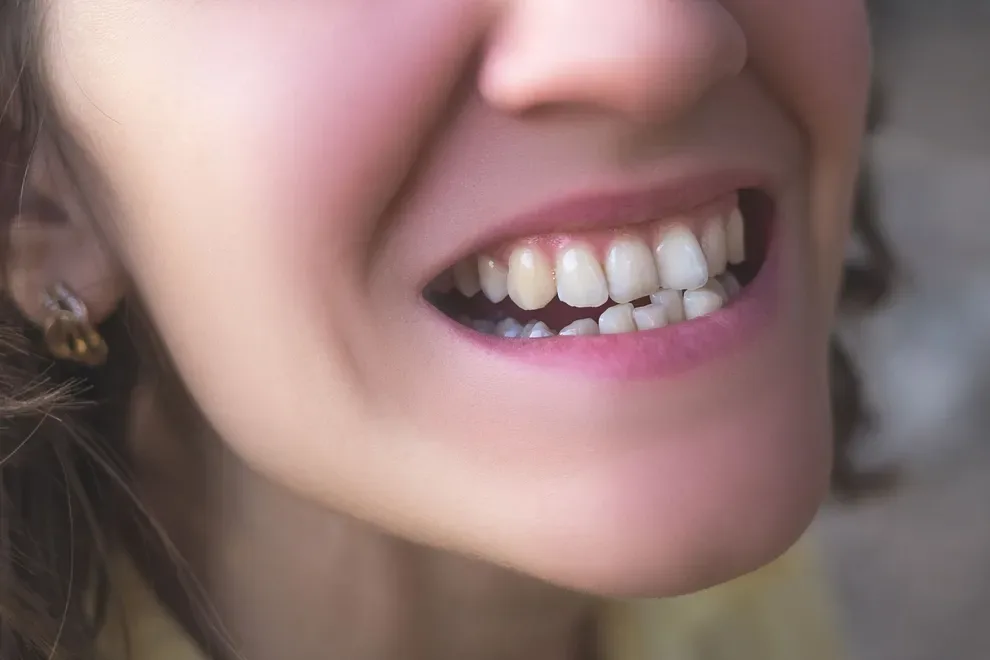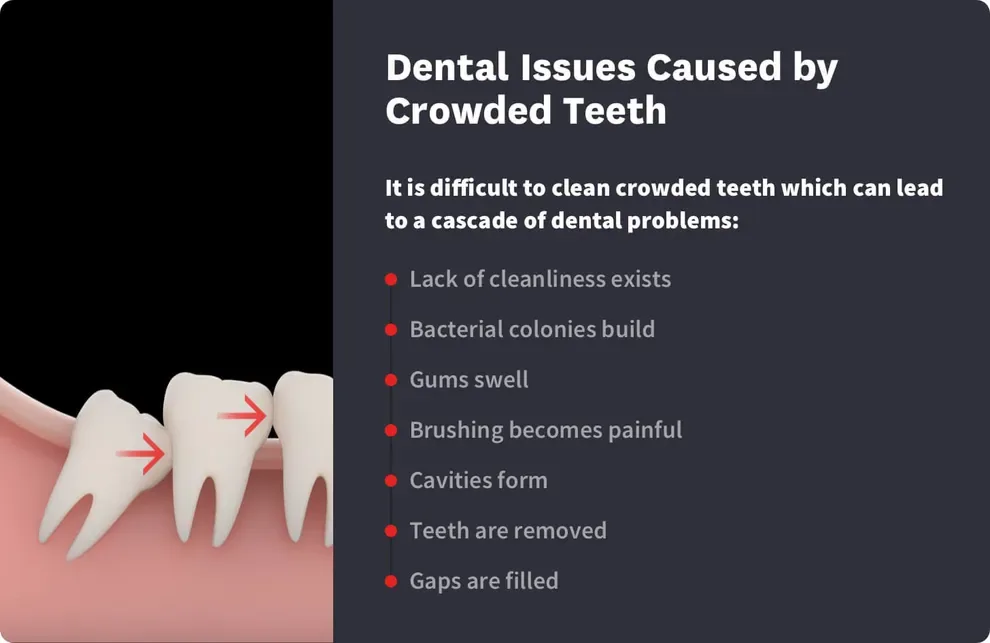Crowded Teeth: Pain, Headaches & Risks

Table of Contents
- Crowded Teeth Pain
- Oral Hygiene Issues
- Appearance of Crowded Teeth
- Ignoring Crowded Teeth
- Medical Team Assistance
- References
You might be aware that crowded teeth can impact your appearance and blunt the power of your smile. But you may not be aware that overlapping teeth can spark several other problems, including some that could put your health at risk.
Crowded teeth have been associated with:
Pain, including persistent headaches.
Other dental health issues, including tooth loss.
Poor appearance, including the potential for missed employment opportunities.
You can ignore crowded teeth, and many people do. But the longer you leave the problem unaddressed, the more likely it is that you'll face dental health issues that are easy to see and hard to correct.
Both braces and aligners can be used to move crowded teeth. Braces are typically recommended for severe cases, and sometimes, people must have teeth pulled before their brackets and wires are placed.
But clear aligners are less expensive than braces, and most people find that they're easier to wear too. They can work well to correct mild to moderate cases of crowded teeth.

Crowded Teeth & Pain
Our teeth are acutely responsive to pain. When molars and incisors bump against one another, the sensations are almost impossible to ignore.
Each tooth in your mouth can transmit pain signals from:
Pulp. The blood-filled center of each tooth contains multiple nerves.
Dentin. The middle layer of teeth is fluid-filled, and feeling there is transmitted to the pulp. Sometimes, that signal is painful.
Ligaments. Each tooth connects to the jaw with a fibrous ligament, and those tissues are acutely pain sensitive.
You might feel discomfort while chewing, as your teeth grind against one another with your jaw movements. But you may also feel pain while your mouth is closed and your lips put pressure on your teeth.
Pain from your teeth can also move into your jaw. You may grit your teeth together to keep them from touching one another, and in time, your muscles grow sore and weary from the extra work. You may feel this discomfort as a headache.
Studies suggest that we can ignore low-level dental pain while we're thinking about something else. If you're consumed with a difficult project at work, for example, or you're talking to someone you love, you may be able to push the pain sensation away.
But ongoing, nagging pain can have a deep impact on your quality of life. You may never feel completely comfortable, as the pain is always dragging at the back of your mind.
Crowded Teeth & Dental Health
Bones need space to do their critical work. When your mouth is packed tight, and the problem is left to fester for years, you can face a cascade of problems that build upon one another.
It's difficult to clean crowded teeth. Research shows that people with straight, spaced teeth tend to have good oral health, while people with a tightly packed jaw have lower oral health scores. When you can't swish a toothbrush around all the exposed surfaces of your teeth, and you can't push dental floss between the cracks between your teeth, problems begin.
The cascade of dental problems caused by poor oral health typically looks like this:
You can't brush or floss properly, so food is easily trapped in your mouth.
The food breaks down into sugars, which bacterial colonies love to feast upon.
The presence of bacteria triggers your body's immune system. As cells swarm to fight off the invaders, soft tissues within your mouth begin to puff up.
Engorged gums bleed when you brush and floss. Each time you have a bad experience, you're less willing to tackle oral hygiene again.
About 31 percent of adults ages 20 to 44 have untreated dental cavities. If yours are tucked between your teeth, you may not see them or feel them until they've eroded much of your dental structure.
Dental roots weakened by swollen gums and deep cavities lose the ability to stay connected to the jaw. You may lose them suddenly while you're eating sticky food, or you may have them pulled at the dentist's office.
When one tooth leaves your mouth, other teeth fall into the hole left behind. That can lead to even more root instability and tooth loss.
All of these steps begin with an inability to clean properly. Your crooked teeth play a major role.
Crowded Teeth & Your Appearance
We’re all told to not judge a book by its cover, but it’s the reality of our world that most people do — at least somewhat.
Every time you look in the mirror, you're reminded that your teeth don't fit together perfectly. You're not the only one that notices that fact.
Your smile is one of the very first things people notice. And often, we make snap judgments about people based on the teeth they show us when they smile.
In studies, people say that those with straight teeth are nearly 50 percent more likely to get a job than someone with a crooked smile. People also say they're less likely to date someone with crooked teeth. They may feel like people with this sort of smile aren't interesting or fun to spend time with.
All of these impressions happen in a split second, and they're very hard to adjust once formed. You may try to win people back to your side with your glittering personality or intellect, but from the moment you open your mouth, they may have already decided what you’re like.
Can You Ignore Crowded Teeth?
Experts say most oral health conditions are preventable. Take care of your teeth, and they're likely to last for a lifetime. But if you don't fix your crooked smile, you may have problems that are much harder to correct.
Teeth worn down by years of grinding together may not have a healthy, protective layer of enamel. Teeth like this will always be vulnerable to attack, and you don't grow more enamel throughout your lifespan.
Longstanding cavities can also impact the integrity of your teeth and jaw. Fixing the problem could mean replacing your teeth with artificial versions, and that can be remarkably expensive.
How Medical Teams Help
Head to a dental professional for help with crooked teeth, and you'll be given three corrective options. The right path for you depends on your dental health, your pocketbook, and your personal preferences.
Dental professionals can fix crooked teeth with:
Clear, plastic trays slide over your teeth. Each tray applies gentle pressure to nudge teeth into ideal positions. Each time you change the trays, you move your teeth just a bit more. You can remove the trays for eating and cleaning.
Doctor-monitored, at-home aligners mean you don’t even have to visit a dental professional in person. You take impressions at home, and a professional assesses the state of your smile. You’re then mailed the aligner trays needed for your treatment plan.
Some forms of crooked teeth are too extensive for aligner treatment. Orthodontists can apply brackets, wires, rubber bands, and headgear to push your teeth into the proper spots.
During treatment, your food choices are limited, as sticky and hard foods will ruin the devices. You also can't remove the hardware for brushing and flossing sessions, making it harder to keep your mouth clean.
Some people start with braces for the heavy lifting portion of care. Then, they switch to more comfortable aligners when they've made progress toward a straighter smile.
Each mouth is different, and so are the therapies oral health professionals recommend. But if you're living with a few teeth crowded together, choosing aligners can mean saving a great deal of time and pain in getting the smile you want. Aligner treatment is also more affordable than other forms of orthodontic treatment.
